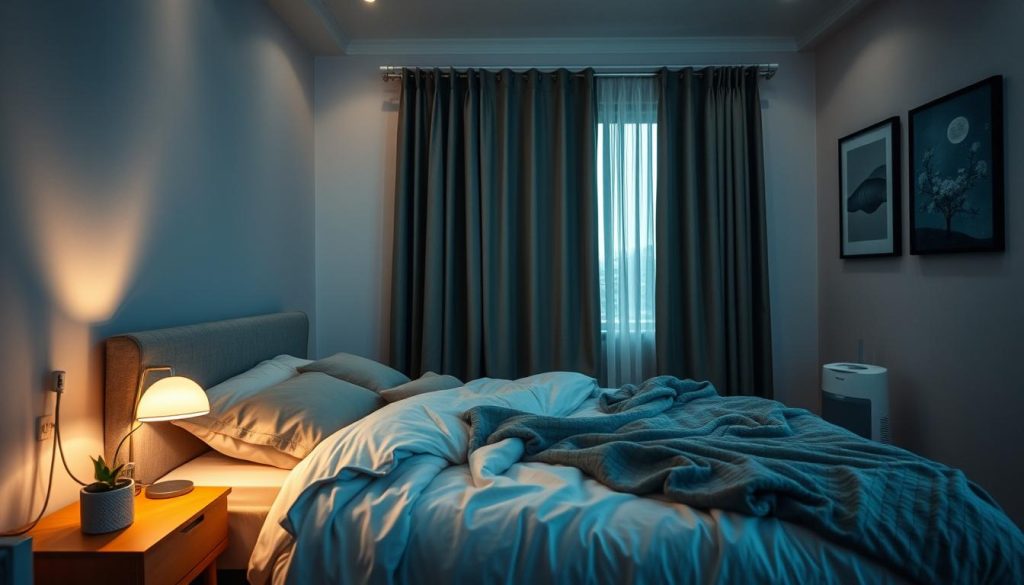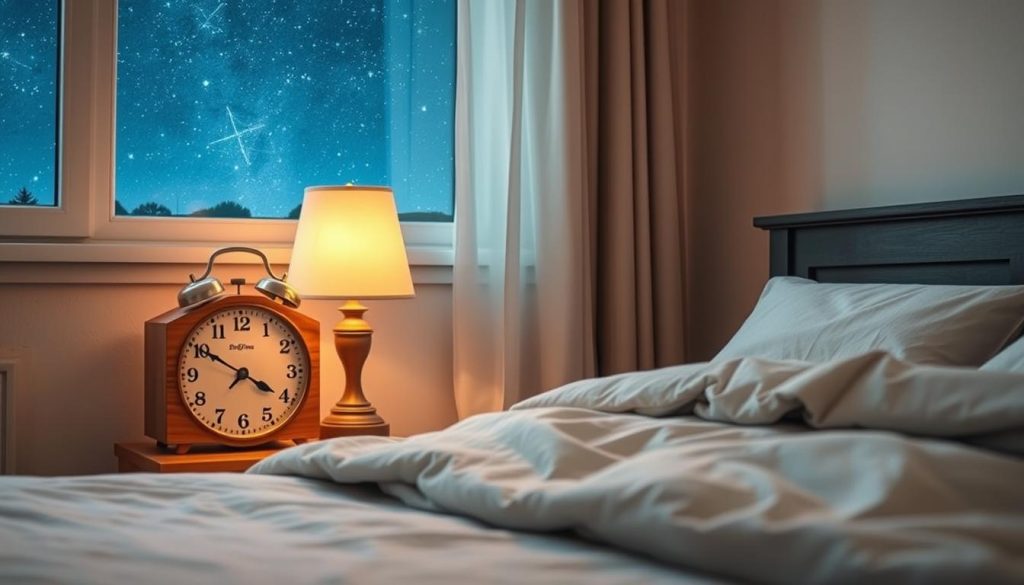Getting quality sleep is key for our health and happiness. But, many face sleep problems that affect our daily lives. This article will show why sleep hygiene matters and offer tips for better sleep.
Sleep hygiene includes habits, behaviors, and surroundings that help us sleep well. By improving our sleep hygiene, we can sleep better and more regularly. We’ll look at how to make our sleep environment better and use relaxation techniques for rest.
Improving sleep hygiene is a journey. It might take time to find what works for you. By using the tips in this article, you’ll start to see the benefits of better sleep and overall well-being.
Understanding the Importance of Quality Sleep
Quality sleep is key for our health and mind. It helps us stay healthy and sharp. But, many people don’t get enough sleep, which hurts their life quality.
The Consequences of Poor Sleep Habits
Not sleeping well can harm our bodies and minds. It makes it hard to focus, remember things, and solve problems. It also weakens our immune system, making us sick easier.
Poor sleep can lead to serious health problems. These include obesity, diabetes, and heart disease.
The Benefits of Restful Sleep
But, sleeping well is very good for us. It makes us feel better, more energetic, and focused. It also helps our immune system, muscles, and heart.
By valuing sleep, we get many benefits. These improve our life quality a lot.

Knowing how important sleep is can change our lives. We can improve our health and happiness by sleeping better. Let’s learn to value sleep for a better life.
Creating an Optimal Sleep Environment
The sleep environment is key to good rest. Think about the temperature and lighting in your bedroom. This can help you sleep better.
Regulating Room Temperature and Lighting
Keeping the room at the right temperature is important. The best temperature for sleep is between 65°F and 70°F. If it’s too hot or cold, it can mess up your sleep.
Lighting also matters a lot. Bright light, like from screens, can stop your body from making melatonin. This hormone helps you sleep. So, try to avoid bright lights and screens before bed.
- Invest in blackout curtains or blinds to block out external light
- Use warm, dim lighting in the bedroom to promote relaxation
- Avoid using electronic devices, such as smartphones and tablets, in the bedroom
By controlling the temperature and lighting, you can make your bedroom a great place to sleep. This can help you rest better and sleep more soundly.

Establishing a Consistent Sleep Schedule
Keeping a regular sleep schedule is key to good sleep habits. A set bedtime and wake-up time help our body’s clock work better. This leads to better sleep quality.
Our body has a natural sleep-wake cycle. Sticking to a sleep schedule helps our body’s clock. This improves our sleep, energy, and brain function.
- Set a consistent bedtime and wake-up time: Aim to go to bed and wake up at the same time every day, even on weekends. This helps reinforce your body’s sleep-wake cycle.
- Gradually adjust your sleep schedule: If your current sleep routine is off, make gradual changes to your bedtime and wake-up time, rather than drastic changes. This allows your body to adapt more easily.
- Avoid napping during the day: While a short power nap can be refreshing, excessive daytime napping can interfere with your ability to fall asleep at night.
| Consistent Sleep Schedule | Inconsistent Sleep Schedule |
|---|---|
| Helps align your body’s circadian rhythm | Can disrupt your body’s internal clock |
| Promotes better sleep quality | Leads to poor sleep quality |
| Enhances energy levels and cognitive function | Can result in daytime fatigue and impaired focus |
By sticking to a consistent sleep schedule, we improve our sleep hygiene. This leads to better rest and many benefits.

Adopting Relaxation Techniques for Better sleep hygiene
To get better sleep, try adding relaxation techniques to your evening routine. Mindfulness and breathing exercises are great options.
Mindfulness and Breathing Exercises
Mindfulness helps you stay present and focused. It can calm your mind and reduce stress before bed. Breathing exercises also help with sleep.
- Try deep, slow breathing, inhaling through your nose and exhaling through your mouth.
- Try the 4-7-8 method: inhale for 4 seconds, hold for 7 seconds, and exhale for 8 seconds.
- These exercises can calm your nervous system and improve sleep.
Avoiding Screen Time Before Bed
Screen time before bed is bad for sleep. Devices like phones and computers can mess up your sleep cycle. This makes it hard to fall and stay asleep.
Try to stop using devices 1-2 hours before bed. Instead, read a book, take a warm bath, or stretch lightly. A screen-free evening helps your mind and body relax for sleep.
The Role of Diet and Exercise in Sleep hygiene
Your diet and exercise habits can affect your sleep quality. Eating nutritious foods and staying active can help you sleep better. We’ll look at how diet and exercise impact sleep and suggest foods that help.
Nutritious Sleep-Promoting Foods
Some foods help you sleep better. Here are the best ones:
- Tart cherries: High in melatonin, a hormone that regulates the sleep-wake cycle.
- Fatty fish like salmon and tuna: Rich in vitamin D and omega-3 fatty acids, which can help improve sleep quality.
- Nuts and seeds: Excellent sources of magnesium, a mineral that plays a role in sleep regulation.
- Whole grains: Provide complex carbohydrates that can help increase serotonin and melatonin production.
- Chamomile tea: Contains apigenin, an antioxidant that binds to certain receptors in the brain that may promote sleepiness.
Eating these foods can help you fall asleep faster and sleep longer. This improves your sleep quality and hygiene.
The Benefits of Exercise for Sleep
Exercise is good for sleep too. It can reduce stress and anxiety, common sleep problems. It also helps your body’s clock, making you tired when it’s time to sleep. Try 30 minutes of moderate exercise daily for better sleep.
| Sleep-Promoting Food | Potential Benefits |
|---|---|
| Tart cherries | High in melatonin, a hormone that regulates the sleep-wake cycle. |
| Fatty fish | Rich in vitamin D and omega-3 fatty acids, which can help improve sleep quality. |
| Nuts and seeds | Excellent sources of magnesium, a mineral that plays a role in sleep regulation. |
| Whole grains | Provide complex carbohydrates that can help increase serotonin and melatonin production. |
| Chamomile tea | Contains apigenin, an antioxidant that binds to certain receptors in the brain that may promote sleepiness. |
Breaking Unhealthy Sleep Habits
Changing sleep habits can be tough, but it’s key for better sleep. At Sleepwell, we help you find ways to break bad habits. We teach you new habits that improve your sleep.
First, find out what’s keeping you awake. Is it late-night social media or sleeping aids? Knowing why you can’t sleep helps us make a plan just for you.
Keeping a regular sleep schedule is important. Try to sleep and wake up at the same time every day. This helps your body get into a rhythm for better sleep. Also, a calming pre-sleep routine, like a warm bath or a book, tells your brain it’s time to sleep.

